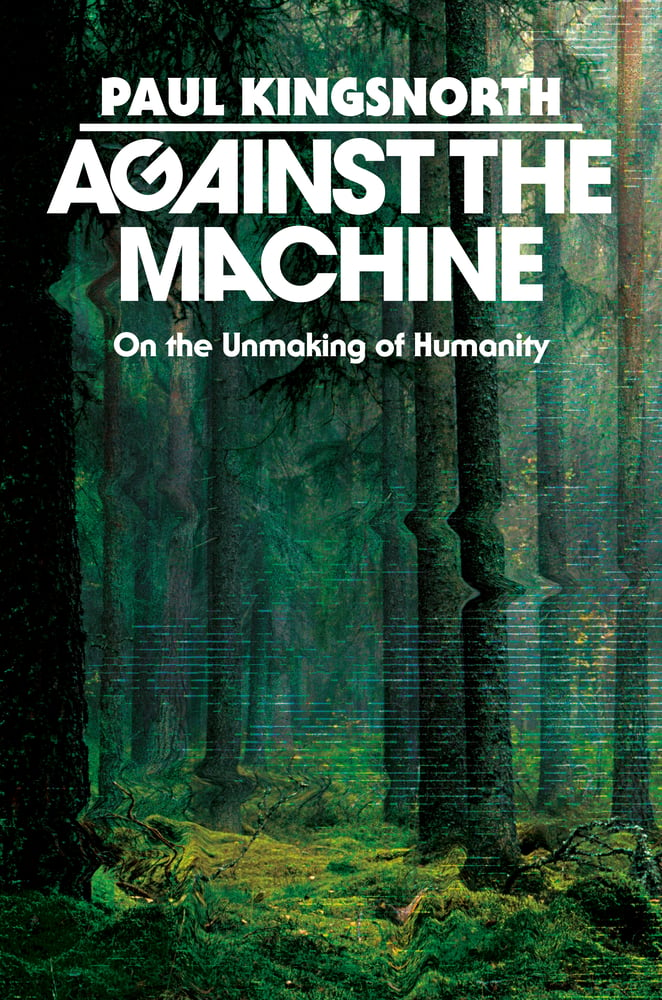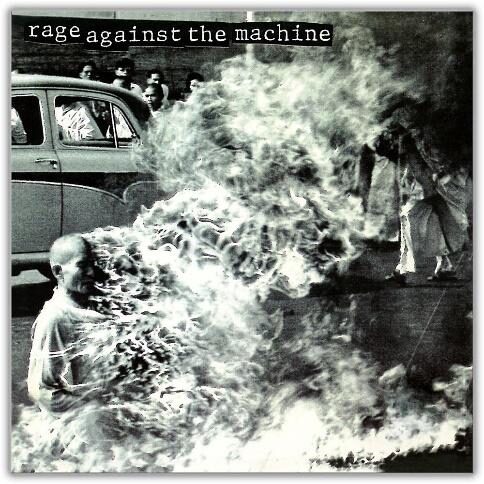When I first started reading Paul Kingsnorth’s serial essays on what he calls the “Machine,” I was hoping that he’d collect them all together in one place. Against the Machine is that place. No doubt many FPR readers are familiar with the Machine, Kingsnorth’s term for that certain something everyone who’s trying to live intentionally knows is there, that force in the world that makes life feel meaningless and rootless, while being full of ersatz and offensively desacralized versions of things that used to provide both meaning and roots. The Machine is “STEM and chatbots and cashless parking meters and economic growth and asteroid mining forever and ever” (xiv). Modernity defined as the decision to settle for the second best delivered efficiently is rapidly reaching (pray it be so) peak insanity. One must either give up and agree to a Faustian bargain with technology, where the knowledge that Jeff Bezos’s stock will increase in value is your only cold consolation outside crack cocaine-style enjoyment of the Next Thing, or, one must think seriously about where to draw lines in the sand, arbitrary or not, and stick to them, whatever the cost may be. I often suspect that my existence is just one minor tidbit for the voracious appetite of some state/corporate machine whose occasional nod to my local well-being is the thinly veiled, insincere noblesse oblige that it appears to be. If you have your own well-defined suspicions in this direction, then give this book to your friends who aren’t yet as “woke” as you are. If you’re still in that Aerosmith stage where “there’s something wrong in the world today, and I don’t know what it is,” then perhaps this book will help you answer that question. From Jacques Ellul to Ivan Illich, from The Matrix to Fahrenheit 451, what ails our specific time and place—as opposed to that biblical incident with the apple that has always ailed us—is being triangulated. One of Kingsnorth’s signal contributions is to put these kinds of reflections in conversation with one another, in a book that is something of an “owl of Minerva” moment.
Hegel’s view that you cannot see the essence of an age until it is over leads me to one of Kingsnorth’s core convictions: that talk about “saving” Western Civilization or Christendom is delusional. A Matthew McConaughey character once opined, “Eden ain’t burnin’, it’s burnt,” and this is a more or less accurate description of Kingsnorth’s tone. While my inner Edmund Burke grimaces at such an implicitly revolutionary stance, it’s difficult to disagree, especially when one spends as much time with painfully average college students as I do. In the course of a seminar discussion, a group of seniors recently told me that they really needed to know more about Christianity, in order to understand the book I’d assigned. I asked them what effort they intended to put forth, in order to remedy this deficiency. By the floor-directed facial expressions that followed, the answer was clearly “none.” This might have been livable—at least they admitted it—had most of these students not intended to pursue careers as high school history teachers. “Burnt” indeed. So Kingsnorth is a radical, no doubt about it. But he is also a Christian, in which case this-worldly utopias and dystopias are both Out. I’m listening.
So here we are. The “culture” around us can valorize nothing other than “More”: more distraction, more Temu knockoffs, more inflation of money and celebrity appendages, more deflating pornography, more screens. Our politics reflects our out-of-ideas cultural twilight accurately, with the added bonus that it has lawyers and guns, in addition to money. Hat tip, Warren Zevon. The whole toxic stew seems more and more intrusive all the time, and the banal, day-to-day insults somehow seem just as infuriating and significant as a high-profile bête noire like Amazon. Just this morning, I walked up to use the new-and-therefore-better card access to the building in which my office is located. The doors work only half the time, as opposed to my ancient key, which always worked. Today, I noticed a new sign on the door, which invites me to—and as Dave Barry likes to say, “I swear I’m not making this up”—scan a QR code that will let somebody know that there was a problem. Somewhere in my soul, a barbarian in my ancient ancestral gene pool just had an episode of berserker rage. (Perhaps this barbarian was related to Buccmaster.)
So from Amazon to doors that don’t work, we vacillate between wanting to fight it and just wanting it to leave us alone. Enter Kingsnorth, and his useful riff on the idea of being a “raw” or a “cooked” barbarian: this is his way of forcing us to decide just how much we actually want to be against the Machine. The metaphor comes from a Chinese source that distinguishes between the “raw” barbarians who live in caves, pay no taxes, provide no men for the army, and so on, where the “cooked” barbarians are the ones who have figured out how to live in the interstices of the reigning order. Both of these approaches have strengths and weaknesses, and to illustrate, I’ll offer the experience of the Russian Old Believers, whose Orthodoxy is nicely consonant with Kingsnorth’s, and whose world was so different from ours that the similarities gain in salience.
In the 1660s, Nikon, the Patriarch of Moscow, decided to update (cue Orthodox hackles rising), Russian Orthodox ritual to bring it more into line with ritual practice elsewhere. The two-finger sign of the cross was the most-discussed of these, but there were all kinds of changes to Russian liturgical books beyond that specific issue. In the ensuing fracas, the Russian church schismed into the officially approved state church and the Old Believers, whose convictions sent them to the geographic periphery of the expanding Russian empire, to small hermitages and larger monastic or monastic-style communities, and sometimes to martyrdom by self-immolation. As depicted on the album cover of Rage Against the Machine’s eponymous debut, the Old Believers raged against a machine over which there could be no victory in this life. The Old Believers splintered into any number of subgroups, but one belief held in common was that the Antichrist was loose in the world, in the form of the state that demanded allegiance to the new ritual. Kingsnorth flirts with the concept of the Antichrist as well, particularly in his chapter “What Progress Wants”—note the implicit premise that “Progress” has a mind of its own. Given the seriousness with which they assessed their situation, the Old Believers had three basic options: to fight the state outright; to flee to the periphery of the Russian empire, where they could not be found or where it was simply too much trouble to find them; or to band together in such ways as to be able to survive state knowledge of their existence. Option One was realistically off the table, as illustrated by those who joined one of the doomed rebellions against the state, such as Pugachev’s in the late eighteenth century. Option Two was a standard method of dealing with an ever more intrusive Russian state; many Old Believers did take this route. Option Three entailed various strategic compromises, such as those reached by the Vyg community of Northwestern Russia, which agreed to prospect for and mine iron and lime for Peter I’s state, on the tacit, unofficial understanding that they might then be left alone.
One expert, a Machine-ish category it should be said, has suggested that AI poses an existential threat to the human race, such that existing data centers should be shut down and any new ones bombed (306). This is Option One above, and while Kingsnorth gives this view some airtime, I think he’s right to argue, like Jacques Ellul, that the Machine is better faced indirectly than directly. Illiterate Russian serfs (Old Believer or otherwise) were able to tie their social betters up in court cases for years. No doubt the internet is fostering likewise the Machine-undermining ability to repair one’s own equipment, if not the legal “right” to repair. In short, as Kingsnorth explicitly acknowledges, there will always be opportunities to use the machine against the Machine (see generally, Chapter XXVI “The Neon God”). This is an Option Three sort of strategy.
As attractive as Option Two is—the “raw” barbarian approach in Kingsnorth’s idiom—flight is an even less realistic option now than it was then. In one of his more poignant observations on the subject of roots, the author notes that “Even if you are living where your forefathers have lived for generations, you can bet that the smartphone you gave your child will unmoor them more effectively than any bulldozer ever could” (19). My county is the size of Connecticut, but the Machine rules here just as it does anywhere else
So that leaves Option Three, which has its own inherent pitfalls: at what point does compromise become capitulation? If the alliance of consumer capitalism with the power of the state is destroying us, along with the planet, at what point does accommodation become ethically impermissible as well as strategically unwise? This basic question perpetually destabilized the Old Believers, even as its thorniness is obvious now. A clear danger of the Option One approach is that we may seek literal or figurative martyrdom out of a misplaced need for a clarity that this life rarely brings. Many Old Believers intentionally put themselves in a position where they would then be “forced” to self-immolate. Criticizing this extreme stance does not free us, though, from the obligation to draw lines in the sand. And here, I’m going to have to sympathize a bit with the radicals among the Old Believers, even if I disagree (and disagree I do) with how they chose to carry out their opposition to the state. We are, Kingsnorth rightly notes, going to have to be fine with imposing Limits on ourselves; we are going to have to rediscover the virtue of asceticism (See 303-307). Philip Rieff doubted that Modern man would ever reconcile to the view that the foundation of happiness was to have as few needs as possible. Kingsnorth, I think, would agree, and so by rediscovering such a view, we’ll cease to be Modern. Pray Modernity doesn’t let the door hit it on its way out.
Kingsnorth’s advice is to find a specific community and figure out how to make that community machine-resistant. What does this mean, in practice? Kingsnorth happens to be a rigorist on the question of smartphones, as am I. His general tone, on my reading, though, says we should be generous enough to recognize that we’re all feeling our way around in the dark. Aside from (maybe) giving the smartphone the Office Space beat-down treatment, I would sum up Kingsnorth’s argument as follows: Set limits on your engagement with the machine. Kingsnorth won’t use a QR code or a digital currency, for example. Retake control of what you pay attention to. Getting your attention, as Antón Barba-Kay has previously pointed out, is what the internet is. So, starve the beast, and refuse to pay attention. This means, and here’s where the Old Believer radicals were probably right, that we’re going to have to be fine not just with Option Three levels of sacrifice (e.g. “screen free Sundays”), but with real, actual Sacrifice.
When people find out I don’t own a smart phone and don’t even carry a flip phone around with me, the next comment or facial expression invariably communicates some version of “So like, what, you don’t have electricity or indoor plumbing either?? Are you some kind of [gasp] Luddite?” As though the Luddites were in error to point out that new technologies were destroying their communities. However, this is at worst a minor annoyance. A bit more seriously, for example, I fully expect to die younger than I potentially could. Life is good, but it’s not the Ultimate good or a good without limits. If we’re going to criticize the transhumanists, then we should look in the mirror and ask whether every new life-extending technique instantly becomes a “right” just by virtue of its existence. There is a non-trivial chance that at some point, I’ll have to refuse the health insurance provided me by my job. There will probably be jobs that my children simply cannot or should not do. Heck, I’m deeply uneasy about the whole college professor schtick now, and my inner Old Believer radical dreams of getting (ahem) fired. It’s about what we’re leaving our kids, though, so I’ll have to resist the lure of the self-immolating confrontation, just as us anti-machine types are going to have to resist the temptation to assume that all the things we don’t like are by definition connected. This is, after all, what distinguishes us from the conspiracy theorists.
Finally, one of the key problems that split the Old Believer communities was the question of whether or not it was permissible to pray for the Emperor (i.e. Antichrist). On this point, I agree with Kingsnorth wholeheartedly: It is long past time to cease praying for and to our false Gods of wealth, success, shiny new digital distractions, and perhaps even the respect of many peers and colleagues, friends and family. If nothing else, we should be grateful for our time and place for making the ersatz nature of false gods so crystal clear. This leads to a book whose tone is ultimately and justifiably hopeful. We may need to rage against the Machine now and then, but we’d better be able to do more than that. Thanks to Paul Kingsnorth for reminding us that it’s past time to stake out our ground against the humanity-destroying technologies and desires that are destroying us and the next generation. In so doing, we will see that
the age of the Machine is not after all a hopeless time. Actually, it is the time we were born for. We can't leave it, so we have to fully inhabit it. We have to understand it, challenge it, resist it, subvert it, walk through it on towards something better. If we can see what it is, we have a duty to speak the words to those who do not yet see, all the while struggling to remain human (317).
Image Credit: Bertha Wegmann, ‘View towards a street through an open window’ via Wikimedia.









2 comments
Debra
Thanks for the review, while waiting to get the book and read it.. in France, where it is selling despite being ignored or censured, and not translated (yet…).
I have no cell phone, and have never had one. Having my hands and mind free from one lets me look up, and observe, and see the world and the people around me, and I have noticed the freedom that I have, that other people can see in me from this obstinate choice. One of the things that I do tell people as I preach (!!! can’t help preaching, sorry) about this subject is that people who have their eyes down all the time, whether they be looking at a smartphone, or at the ground are… slaves.
Keeping your eyes down all the time is not modesty or even humility, it is a sign of submissive behavior, in the midst of a culture that has become rabid about individual freedom. One more paradox…
Rob G
Very good review, Aaron. I received the book in the mail yesterday, started it this morning and finished the first section. It’s very interesting reading it in light of the book I’m currently rereading and am near the end of, Flora Thompson’s “Lark Rise to Candleford,” her memoirs of life in 1880’s/90’s rural England. Reading Paul’s insights into the origins of the changes that Thompson documents alongside her own observations about those changes provides a fascinating, informative juxtaposition . And of course Paul himself has commented frequently on these changes throughout his earlier work, in “Real England,” for example.
In any case, full marks on a great essay.